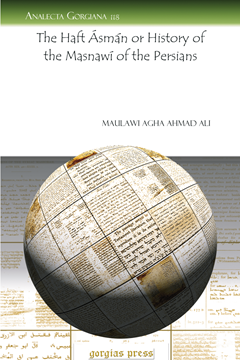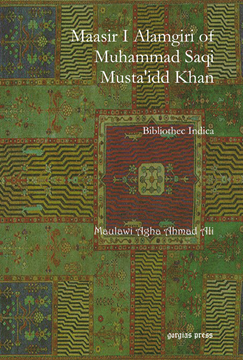Maulawi Agha Ahmad Ali
The Haft Ásmán or History of the Masnawí of the Persians
Series: Analecta Gorgiana 118
ISBN: 978-1-60724-052-5
Presented in the original Persian, this volume represents the solely published first volume of the Haft Ásmán “seven heavens,” or a compendium of poetry in the seven epic meters of Persian poetry. This history of the masnawí, or Middle Persian poetic form, written in rhymed couplets, is here presented by one of the recognized teachers of Persian in India. This, his final work, was intended to be an introduction to the works of Nizami. As such it contains invaluable nuggets about the Persian poets and their poetry.
$74.00 (USD) $44.40 (USD)
Maasir I Alamgiri of Muhammad Saqi Musta'idd Khan
Bibliothec Indica
ISBN: 978-1-59333-915-9
Written in the original Persian, this account of the reign of the Mughal emperor Aurangzib-Alamgir (reigned 1658-1707) is a standard resource for the this final great ruler of the empire. The chronicles of the emperors of this period in India are in general a blend of biography and history, but in the case of Aurangzib, the emperor is portrayed in terms of unstinting praise. Comprising both official sources, such as court circulars and letters, and personal recollections, the work was initiated by Mirza Muhammad Kazim, put aside until after the Emperor’s death, and completed in 1710 by Saqi Must`ad Khan.
$238.00 (USD) $142.80 (USD)


